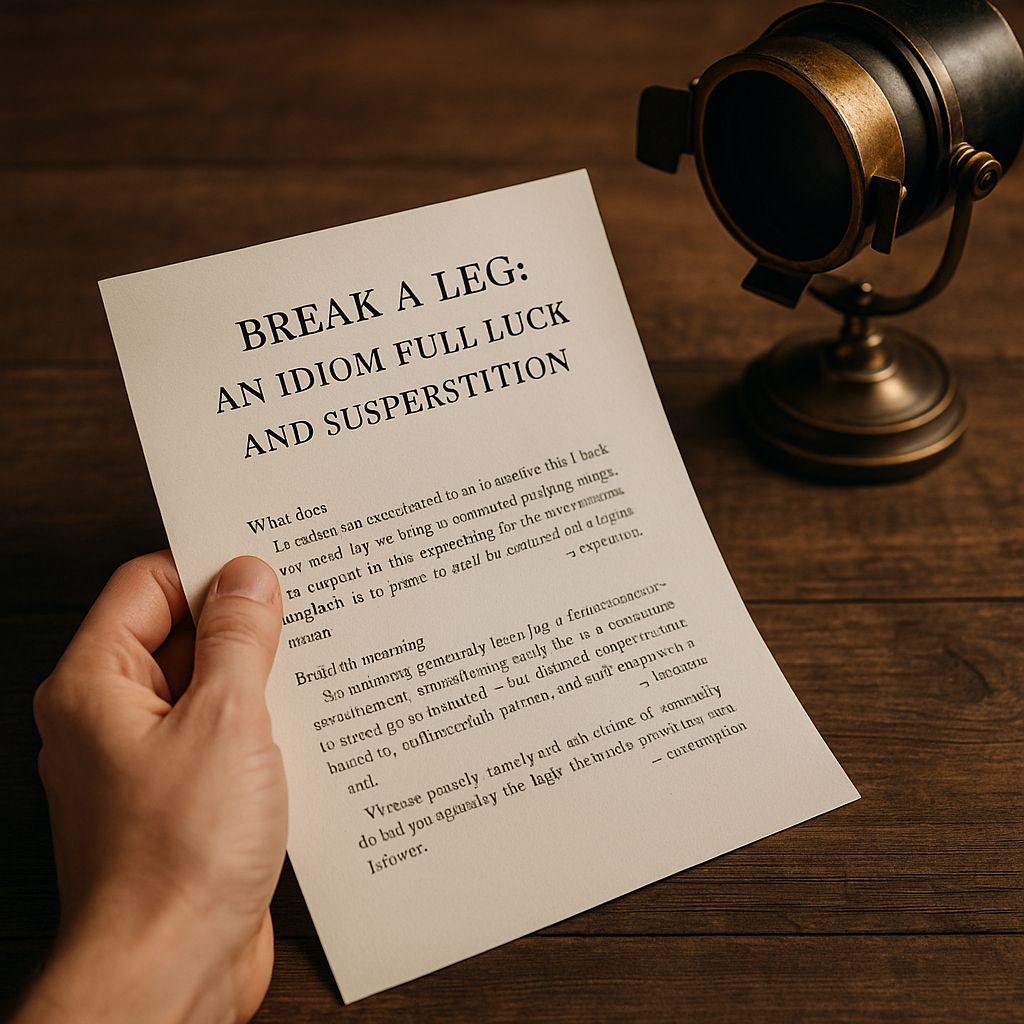In the colorful world of performance arts, few phrases are as commonly heard and widely misunderstood as “break a leg.” To someone outside the industry, it may sound like a threat or insult. But within the performing community, it’s one of the most endearing and sincere ways to say: “Good luck.”
So, why do we say break a leg? What is the true break a leg meaning, and how did this expression become so closely tied to the world of acting, music, and stagecraft? In this article, we’ll explore the break a leg origin, its cultural context, and how it has earned its place among the most iconic English idioms.
What Does “Break a Leg” Actually Mean?
The literal meaning of “break a leg” is, of course, injurious. But when used as a figure of speech, it becomes a well-wishing phrase. Performers commonly say it to one another before taking the stage, replacing the more direct phrase “good luck.”
The reason for this linguistic substitution lies in the deep-rooted superstitions of the theater. In this tradition, saying “good luck” is believed to jinx the performance. Saying “break a leg,” however, tricks fate into bringing success instead of failure.
In short, the break a leg meaning is: I hope you perform excellently—without actually saying those words.
The Curious Origin of the Phrase
The break a leg origin isn’t traced back to a single source, but rather several compelling theories. Let’s look at the most prominent explanations.
1. The Stage Leg Theory
In theater terminology, a “leg” refers to the tall, narrow curtains that frame the stage. One theory suggests that “breaking a leg” means stepping past these curtains and actually getting on stage to perform—a sign of success.
So, when someone says “break a leg,” they’re really saying, “I hope you get to perform tonight.”
2. Applause and Bending the Knee
In Elizabethan times, audiences didn’t clap—they stomped their feet or bowed deeply. If your performance was strong enough, spectators might bend their knees or legs as a gesture of admiration. Therefore, a “broken leg” could symbolize enthusiastic approval from the audience.
3. The Understudy Irony
Another theory says understudies (actors who perform if the lead is unavailable) would joke that they hoped the main actor would literally “break a leg” so they’d get to go on. While darkly humorous, this theory reflects the competitiveness of show business and adds irony to the phrase.
4. German Influence
The German phrase “Hals- und Beinbruch,” meaning “break your neck and leg,” is a traditional expression of good luck in aviation and performance. Some historians believe English speakers adapted it directly into “break a leg.”
This lends credibility to the idea that the phrase isn’t purely theatrical in origin but has broader cultural roots.
Why Superstitions Thrive in Theater Culture
You might wonder: why not just say what you mean?
The answer lies in the ritualistic nature of performance arts. The world of live entertainment is full of unpredictability. Superstitions like avoiding the word “Macbeth” or always leaving a ghost light onstage are part of a larger psychological coping mechanism.
For many performers, these sayings and traditions provide comfort and routine—something to ground them before stepping into the unknown of a live audience.
“Break a leg” is more than just an idiom—it’s a ritual. Saying it creates a moment of connection and solidarity among performers.
How “Break a Leg” Became a Common Idiom
While originally tied to the stage, “break a leg” has since moved beyond theater and into the world of common idioms. It’s often used before important events like:
- Job interviews
- Public speeches
- Exams
- Competitions
- Dance or music recitals
The phrase has become part of English idioms more generally, used to express hope and encouragement in situations that involve performance, pressure, or a challenge.
Other Strange English Idioms You Should Know
The English language is rich in idioms that, at first glance, make little sense. If “break a leg” surprised you, here are a few more common idioms that are just as strange:
- “Bite the bullet” – To endure something painful or unpleasant
- “Burn the midnight oil” – To work late into the night
- “Hit the nail on the head” – To be exactly right
- “Under the weather” – To feel ill
- “Cost an arm and a leg” – Very expensive
These idioms often have fascinating origins themselves and make English colorful, expressive, and—sometimes—utterly confusing for learners.
Idioms in Language Learning
For those learning English, idioms like “break a leg” present both a challenge and an opportunity. Since their meanings aren’t literal, they must be learned through context and usage.
But idioms also help learners:
- Sound more fluent
- Understand native speakers better
- Appreciate the culture behind the language
- Add variety to their vocabulary
Many English teachers use “break a leg” as a gateway idiom when introducing students to the idea of figurative language.
The Power of Positive Language
Interestingly, while “break a leg” seems negative, its emotional intent is completely positive. This contrast is what makes it so memorable. It represents how language can be playful, ironic, and deeply cultural.
The phrase reminds us that words carry layers of meaning, and understanding those layers helps us connect more deeply with the people and communities who use them.
When Not to Say “Break a Leg”
While the idiom is widely accepted in performance-related contexts, there are still times when it might not be appropriate:
- Medical settings: obviously, it could sound insensitive
- In a literal context, like before a sporting event with a risk of injury
- With non-native speakers unfamiliar with the idiom
In these situations, a more straightforward “good luck” might be safer and more appropriate.
A Phrase That Brings Us Together
Ultimately, why do we say break a leg? Because it’s part of a tradition that connects generations of performers. It’s a nod to those who’ve stood nervously in the wings before their moment in the spotlight. It’s a phrase passed down with affection, humor, and respect.
Whether you’re stepping onto a Broadway stage or into a classroom to give a speech, “break a leg” is a reminder that you’ve got this, and that others are rooting for you—even if they say it in a quirky way.
So the next time someone tells you to break a leg, take it as the highest form of encouragement—and know that you’re part of a long, rich tradition in the English-speaking world.




